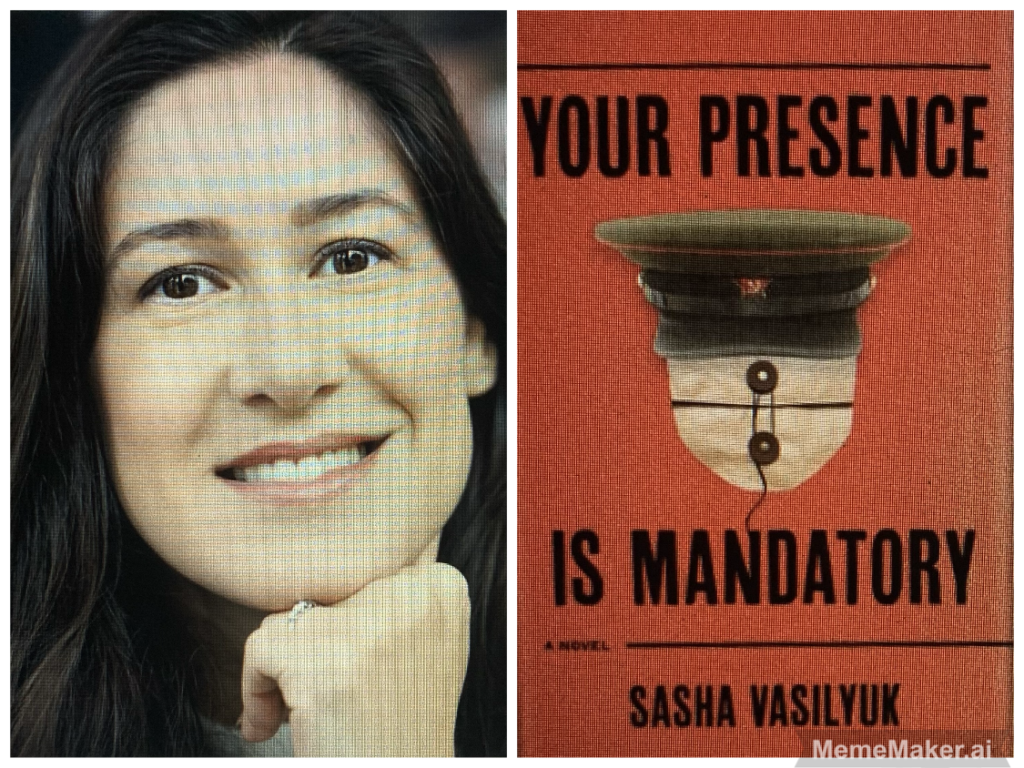Newsletters
Q&A With Sasha Vasilyuk
New Information about Upcoming Book Related News
Q&A With Sasha Vasilyuk
Sasha Vasilyuk is an author and journalist whom I’m happy to do this Q&A with today. Sasha is the author of her debut novel Your Presence Is Mandatory which came out on April 23rd & Sasha’s articles have appeared in The New York Times, CNN, Harper’s Bazaar, Time, Los Angeles Times, San Francisco Chronicle & many others!
Q: Sasha would you please give a brief description of Your Presence Is Mandatory?
A: It’s a historical saga that spans from World War II until the Russia-Ukraine conflict about a Soviet veteran with a dangerous secret and his wife and children who live in the shadow of all he hasn’t told them. It begins in 2007 with the death of our protagonist, a beloved grandfather named Yefim, whereafter his widow finds his letter addressed to the KGB that reveals his hidden past. The novel follows the story of young Yefim, a Jewish soldier in the Soviet army fighting the Nazis, interlaced with the story of his family in the peaceful decades after the war who don’t really know him.
My novel is inspired by real events, something that was important to me as a journalist venturing into fiction writing. It represents the untold stories of millions of other Soviet families who lived at the mercy of totalitarian rulers.
Q: I read a post you put on LinkedIn ten months back, that Your Presence Is Mandatory took four years to write and a year and a half to edit it and that it was due to 2 children, moving countries and war. What lessons and emotions do you want readers to learn & feel after reading Your Presence Is Mandatory?
A: Four years is not very long for a novel, but while I wasn’t in a particular hurry to finish it, the full-scale invasion of Ukraine began as I was finishing my last draft, so suddenly my novel had a much more urgent context.
My novel reveals the untold side of WWII that has been silenced by both German and Soviet governments. I’d also like readers to learn the historical and psychological background of people who lived in Ukraine and Russia through the 20th and 21st century. Through the story of Yefim and his wife Nina, Your Presence Is Mandatory focuses on the hold that fear and shame can have on a person and on a whole generation. The message – if a novel could have a message – is that when history isn’t passed on by witnesses, it can be appropriated by governments and used as a weapon of propaganda and even war. And so, I’d like readers to feel empathy and outrage and know that behind the current news headlines stands a whole complex emotional baggage.
Q: Would it be fair to say your journalism career helped with researching and writing Your Presence Is Mandatory?
A: Absolutely. Like many journalists, I’d always been both fascinated by and afraid of fiction writing. But basing it on real events and relying on research paradoxically made it easier for me to round it out with invention. I had to research both WWII – specifically the treatment of Soviet prisoners of war and forced laborers – as well as Soviet and post-Soviet life through seven decades. Just as in journalism, the best, most colorful and telling anecdotes often came from first-hand accounts, be it interviews with survivors or my own grandmother’s memoir.
Q: What will your second book be about if you are currently writing it?
A: I’m working on a more contemporary-set novel about an idealistic young woman who returns to Russia after many years in the U.S. to help her estranged, dying father only to get ensnared in a dangerous political intrigue as Russia ramps up to attack Ukraine. It’s in its very early stages, so a lot can – and will! – change, but I’m curious to explore what it means to love or belong to a nation and how our personal relationships intersect with our political beliefs.
Q: What is your advice for anyone wanting to be a journalist and author?
A: Writing is a craft and needs to be practiced, so start writing young and don’t wait for life to happen to you. Whether it’s poetry, short stories or novels, you’ll get better the more you do it. Meanwhile, to be a full-time journalist takes a particular set of skills, the most important of which is what used to be referred to as “a nose for story”. But there are also different types of journalism out there – from cultural critique to daily news to war reporting to longform investigative pieces – and whichever you choose, you really must love it to succeed in it as a lifelong career. It’s fast-paced and often tough work, but it’s also one of those rare jobs that truly can have an impact on society.
Q: What’s it like knowing that articles have appeared in The New York Times, CNN, Harper’s Bazaar, Time, NBC, Los Angeles Times, San Francisco Chronicle & others?
A: It’s super exciting when your article comes out – especially when it’s in a big-reach publication that is well-read – but a few weeks or months later, it sort of feels like something that happened to you once a while back. It’s kind of like a comet: very bright and quickly gone.

